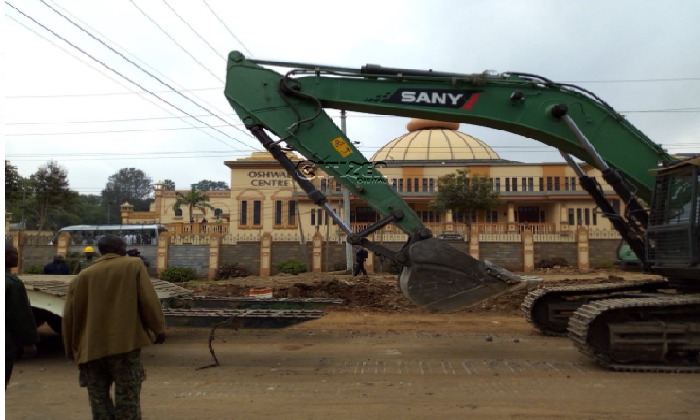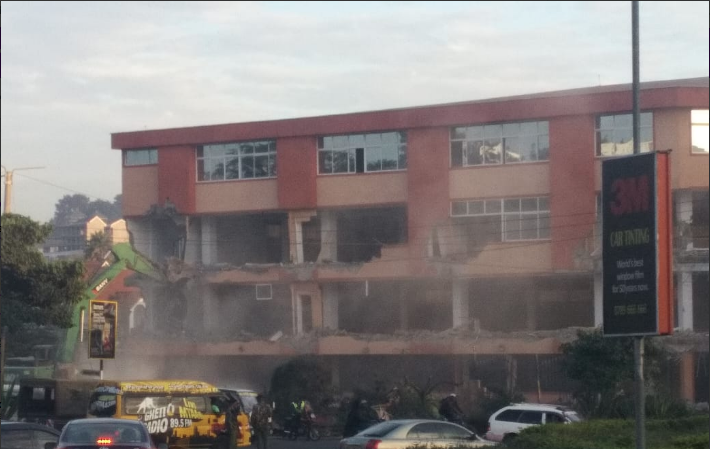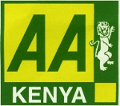Nairobi Demolitions: Will Insurance Cover the Losses?
Posted on 2018-08-13
Kenyans have witnessed some of the most unprecedented demolitions of several landmark commercial and residential properties around Nairobi. The demolitions have caused shock and anger but also praise and cheer from a lot of online communities calling for the end of impunity from top businessmen and women. The demolition of these structures designated to be sitting on riparian land and illegally acquired has marked over 4000 buildings for demolitions.
The exercise started in the early morning hours of Tuesday 10th August 2018 with the destruction of Shell petrol station and Java restaurant in Kileleshwa, Nairobi.
The latest victims of the exercise are South End Mall in Langata and Nakumatt Ukay in Westlands. Many of the tenants and landlords in the affected buildings have managed to salvage their belongings and assets before the demolition exercise.
The city is now gripped by the guessing game of what building will be next on the demolition list.
Riparian Land
The combined forces of government and city authorities including the Nairobi City Council, Kenya Police, Nairobi Regeneration Committee and the National Environment Management Authority (NEMA) have led the exercise to reclaim the riparian land that had been encroached.
Riparian land in its simplest form means land on the river banks. Nairobi has several rivers including river Nairobi, Kamiti, Kirichwa and others.
Article 67 of the Kenyan Constitution says riparian land is public land hence should not be allocated to anyone. Article 62, on the other hand, notes that all rivers, lakes and all land between high and low water marks are public land
Most insurance companies in Kenya offer a wide range of insurance covers for landlords and tenants for the commercial and residential market. These are some of the insurance covers applicable to affected and yet to be demolished buildings.

Fire and Burglary Insurance
Landlords of commercial properties can take out a fire and burglary insurance cover to cover their buildings against any sort of fires, explosions and damages from burglary or thefts. This is the most common type of insurance cover for most commercial properties
Domestic / Home Insurance
This is the equivalent of the fire and burglary insurance policy but it is mainly targeted at residential homes. There are several sections under this cover for one to choose from. These include the building cover which covers the building against flooding, fire, burglary, explosion and natural disasters like earth quakes.
Secondly is the contents cover which covers the furniture, fittings and furnishings in the home e.g. TV set, kitchen appliances, clothes and other items commonly kept in the home
Others sections on this home/domestic insurance plan include the all risks, occupier liability and owner liability
All Risks Insurance
This is a secondary insurance policy that is taken in additional to any of the above two insurance policies. It covers moveable items like laptops, mobile phones, cameras, jewellery and other moveable valuables from most risks like theft, water damage, and partial damage among others.
Will the insurance cover demolitions?
What most insurance customers are asking is if the damage and loss of assets and the consequential loss will be covered under existing insurance policies.
The unfortunate answer is NO. While this may seem harsh and unfair to the victims of these losses, there is good and clear reasoning behind it.
There are 2 main reasons why insurance will not cover the damages and losses form these demolitions.
- Government or Public Authority
- Reasonable Care
The Fire and Burglary policy exclusions 6 states that the insurance policy “shall not cover loss or damage occasioned by or through or in consequence of the action or order of any Government or Public Authority”.
“The policy does not cover loss or damage directly or indirectly caused by seizure, confiscation, nationalisation, requisition, expropriation, detention, legal or illegal occupation of any property insured hereunder, embargo, condemnation, nor loss or damage to the Buildings and/or Contents by law, order, decree or regulation of any governing authority, nor for loss or damage arising from acts of contraband or illegal transportation or illegal trade.”
The demolitions carried out by the NEMA and Nairobi City Council therefore automatically translates to the losses not being covered by the insurance policy.
The insurance states that the insured should exercise due care and caution for the insured interests. Having failed to adhere to the notice of demolition given to landlords and tenants, the insured may be judged to have neglected due care / caution.
With the demolitions set to continue into its second week, landlords and tenants are faced with yet more misery as authorities. Consult your insurance company or insurance broker to find get details of your insurance policy.
Image sources : CitizenTV Digital Kenya































